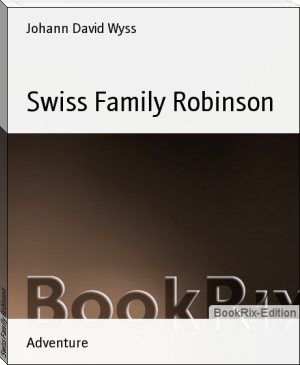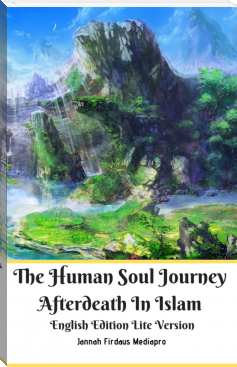Swiss Family Robinson - Johann David Wyss (poetry books to read txt) 📗

- Author: Johann David Wyss
- Performer: -
Book online «Swiss Family Robinson - Johann David Wyss (poetry books to read txt) 📗». Author Johann David Wyss
most curious party we formed: Fritz adorned with his belt of margay
skin, and Jack, with his extraordinary headdress, looked like a couple
of young savages.
Their mother and I walked together; she, of the whole party, being the
only one unarmed, carried a jar in which to get butter from Tentholm;
we were preceded by the dogs Turk armed most effectually with his
cuirass of porcupine skin, and Juno keeping at a respectful distance
from so formidable a companion.
Master Knips fully intended to mount his charger as usual; but when he
saw him arrayed apparently in a new skin, he approached him carefully,
and touching him with one paw, discovered that such a hide would make
anything but an agreeable seat; the grimace he made was most comical,
and chattering vociferously he bounded towards Juno, skipped on her
back, seated himself, and soon appeared perfectly reconciled to the
change of steed.
The flamingo saw us starting, and, having been much petted during the
last day or two, considered himself entitled to accompany us; for some
time he kept beside the children, following first one and then another
as they explored the wood on either side; their irregular course,
however, at length disgusted him, and, abandoning them, he walked
sedately by my side.
We strolled on in the cool evening air, following the course of the
stream. The boys roamed ahead of me, intent on exploration.
Presently I heard a joyful shout, and saw Ernest running at full speed
towards me, followed by his brothers. In his hand he held a plant, and,
panting for breath, and with sparkling eyes, he held it up to me.
`Potatoes! Potatoes, father,’ he gasped out.
`Yes,’ said Jack, `acres and acres of potatoes!’
`My dear Ernest,’ said I, for there was no mistaking the flower and
leaf, and the light clear-green bulbous roots, `you have indeed made a
discovery; with the potato we shall never starve.’
`But come and look at them,’ said Jack, `come and feast your eyes on
thousands of potatoes.’
We hurried to the spot: there, spread out before us, was a great tract
of ground, covered with the precious plant.
`It would have been rather difficult,’ remarked Jack, `not to have
discovered such a great field.’
`Very likely,’ replied Ernest, smiling, `but I doubt if you would have
discovered that it was a potato field.’
`Perhaps not,’ said Jack, `you are quite welcome, at all events, to the
honour of the discovery; I’ll have the honour of being the first to get
a supply of them.’ So saying, he dug up, with hands and knife, a number
of plants, and filled his game-bag with the roots. The monkey followed
his example, and scratching away with his paws most cleverly, soon had
a heap beside him. So delighted were we with the discovery, and so
eager were we to possess a large supply of the roots, that we stopped
not digging until every bag, pouch and pocket was filled.
Some wished to return at once to Falconhurst, to cook and taste our new
acquisition; but this I overruled, and we continued our march, heavily
laden, but delighted.
`How,’ said I, `can we thank the Giver of all these blessings,
sufficiently?’
`Oh,’ said Franz, `we can say, “We thank thee, O Lord, for all thy
goodness and mercy; and bless us for Jesus Christ’s sake. Amen.”’
`That would not be sufficient,’ said Fritz. `Do you think it would be
enough just to say to father and mother: “Thank you for all you do,”
and not to show that we were really thankful, by loving them and doing
what we can to please them?’
`You are quite right, Fritz,’ said I; `Franz did not say all that was
necessary, he should have added, “Give me grace to do Thy will, and to
obey Thee in all things.”’
As we thus talked, we reached the head of our streamlet, where it fell
from the rocks above in a beautiful, sparkling, splashing cascade. We
crossed and entered the tall grass on the other side.
We forced our way through with difficulty, so thick and tangled were
the reeds. Beyond this, the landscape was most lovely. Rich tropical
vegetation flourished on every side: the tall stately palms, surrounded
by luxuriant ferns; brilliant flowers and graceful creepers; the
prickly cactus, shooting up amidst them; aloe, jasmine and
sweet-scented vanilla; the Indian pea and, above all, the regal
pineapple*, loaded the breath of the evening breeze with their rich
perfume. The boys were delighted with the pineapple, and so eagerly did
they fall to, that my wife had to caution them that there were no
doctors on our territory, and that if they became ill, they would have
to cure themselves as best they might.
* At this point the author seems to assume that pineapples
grow on trees. They do not.
This advice, however, seemed to have small effect on my sons, and
showing Knips what they wanted, they sent him after the ripest and best
fruit.
While they were thus employed, I examined the other shrubs and bushes.
Among these I presently noticed one which I knew well from description
to be the karatas.
`Come here, boys,’ I said, `here is something of far more value than
your pineapples. Do you see that plant with long pointed leaves and
beautiful red flower? That is the karatas. The filaments of the leaves
make capital thread, while the leaves themselves, bruised, form an
invaluable salve. The pith of this wonderful plant may be used either
for tinder or bait for fish.
`Suppose, Ernest, you had been wrecked here, how would you have made a
fire without matches, or flint and steel?’
`As the savages do,’ replied he, `I would rub two pieces of wood
together until they kindled.’
`Try it,’ I said, `but, if you please, try it when you have a whole day
before you, and no other work to be done, for I am certain it would be
night before you accomplished the feat. But see here,’ and I broke a
dry twig from the karatas, and peeling off the bark, laid the pith upon
a stone. I struck a couple of pebbles over it, and, they emitting a
spark, the pith caught fire.
The boys were delighted with the experiment. I then drew some of the
threads from the leaves, and presented them to my wife.
`But what,’ said Fritz, `is the use of all these other prickly plants,
except to annoy one? Here, for instance, is a disagreeable little
tree.’
`That is an Indian fig,’ said I. `It grows best on dry, rocky ground;
for most of its nourishment is derived from the air. Its juice is used,
I believe, medicinally, while its fruit is pleasant and wholesome.’
Master Jack was off in a moment when he heard of a new delicacy, and
attempted to gather some of the fruit, but in vain; the sharp thorns
defied his efforts, and with bleeding hands and rueful countenance, he
returned.
I removed the thorns from his hands, and making a sharp wooden skewer,
I thrust it into a fig, and quickly twisted it from its branch and
split it open with a knife, still holding it upon the skewer. The rest
followed my example, and we regaled ourselves upon the fruit, which we
found excellent.
Ernest carefully examined the fig he was eating. `What’, he exclaimed,
presently, `are these little red insects? They cling all over the
fruit, and I cannot shake them off. Can they be cochineal?’
He handed me the fig, and I examined it attentively.
`You are quite right, my boy,’ I said, `there is no doubt this is the
real cochineal. However, though it is worth its weight in gold to
European traders, it is of little use to us, I am afraid, unless any of
you care to appear in gay colours. The cochineal, you know, forms the
most lovely scarlet dye.’
`No, thank you,’ said Jack, `but we will take a lot of it when we go
home again. Now let us find something more useful to us.’ And they
thereupon plied me incessantly with questions concerning every plant
and shrub we passed.
`Stop, stop,’ I said at length. `The most learned naturalist would be
much puzzled with many of these trees; and I, who have never seen any
of them before, and know them merely by description, cannot pretend to
tell you the names, or explain to you the use of one quarter of them.’
Discussing, however, the properties of such shrubs as I did know, we at
length reached Tentholm. Everything was safe, and we set to work to
collect what we wanted. I opened the butter cask from which my wife
filled her pot. Fritz saw after the ammunition, and Jack and Ernest ran
down to the beach to capture the geese and ducks. This they found no
easy matter, for the birds, left so long alone, were shy, and nothing
would induce them to come on shore and be caught. Ernest at length hit
upon an ingenious plan.
He took some pieces of cheese, and tied them to long strings. This bait
he threw into the water, and the hungry ducks instantly made a grab at
it; then with a little skilful manoeuvring he drew them on shore.
While Jack and he were thus busily employed catching and tying the
rebels together by the feet, we procured a fresh supply of salt, which
we packed upon Turk’s back, first relieving him of his coat of mail.
The birds we fastened to our game-bags, and carefully closing the door
of our tent, started homewards by the seashore. After a cheerful and
pleasant walk, we once more reached our woodland abode. I released the
birds, and, clipping their wings to prevent their leaving us,
established them on the stream. Then, after a delicious supper of
potatoes, milk and butter, we ascended our tree and turned in.
Having remarked a great deal of driftwood on the sands the preceding
evening, it occurred to me that it would be well to get some of it, and
make a kind of sledge, so that the labour of fetching what we wanted
from our stores at Tentholm might not fall so heavily on ourselves.
I awoke early and roused Ernest as my assistant, wishing to encourage
him to overcome his natural fault of indolence. After a little
stretching and yawning, he got up cheerfully, pleased with the idea of
an expedition while the others still slept, and we made our way to the
beach, taking with us the donkey, who drew a large broad bough, which I
expected to find useful in bringing back our load.
As we went along, I remarked to Ernest that I supposed he was rather
sorry for himself, and grudged leaving his cosy hammock and pleasant
dreams at this untimely hour.
`Oh, father, do not laugh at my laziness! Indeed I mean to cure myself
of it. I am very glad to go with you. I intended to shoot some more of
the ortolans this morning, but there will be plenty of time afterwards.
The boys will be shooting at them, I daresay, but I don’t expect they
will have any great luck.’
`Why not, pray?’ inquired I.
`I don’t believe they will know what shot to use at first, and,
besides, they will most likely shoot upwards at the birds and be sure
to miss them, on account of the great height and thickness of the
branches and foliage.’
`Well, Ernest, you certainly possess the





Comments (0)